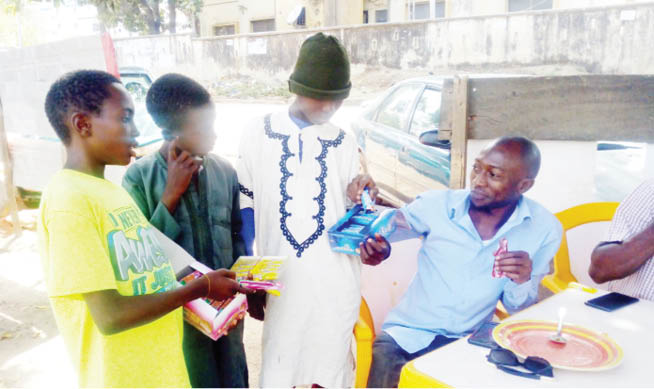From time immemorial, street hawking by children has been a phenomenon in Nigeria. Though adults engage in it, that of children is often striking because of their vulnerability and the concern that much of their growing up period and useful development could have been negatively swayed.
It is a common sight in Nigeria to see children hawking all manner of things on the streets, along major roads and even on risky highways that vehicles ply speedily and sometimes recklessly. More worrisome is the fact that many of them hawk during school hours, suggesting that they are out-of-school children for various reasons.
Nonetheless, most of the reasons may not be far-fetched as the common understanding attached to street hawking in this respect is poverty and families trying to make ends meet by sending their children to the streets to sell menial things. Among the things hawked are groundnuts, sachet water, biscuits and sweets, fruits, others.
Those children hawking on the highways often run after moving cars to sell whatever they are hawking to the occupants in the cars. Sometimes they strategically locate themselves at security check points or places with potholes where they are certain that cars would definitely slow down. Some are located on expressways and often run after fast moving cars to make sales. Then another car passes by and the same scenario plays out.
Sometimes the occupants of the cars who buy from these child hawkers throw money on the ground for them to pick, just as the children also throw the item purchased into the cars for them to pick up. These risky scenarios play out as the transactions between the children and the buyers is completed as the cars speed by.
But how much are these children making for their families from these risky street hawking one may ask?
Some of the children who spoke to our correspondent on the streets of Jos, the Plateau State capital, explained why they are hawking and approximately how much they make each day.
One of the children, Isah Mohammed Sani, who hawks sweets and chocolate around Hill Station Junction in Jos said he comes from Corner Shagari to town to hawk, and that he purchased what he sells at N700 and upon selling them, he makes up to N250 profit. This is apart from other exigencies in the course of selling the products.
Ibrahim Auwalu also said he was supposed to be begging on the streets but chose to hawk instead and that he is happier hawking rather than begging no matter how little the profit.
Reacting, Judith Martins of the Destiny Teen Challenge Women and Children Centre in Jos, said hazards and negative implications of children hawking include sexual harassment, abduction, societal stigmatisation, accidents, school dropout, increase in illiteracy level, among others.
She said the reasons for child hawking are poverty and ignorance, but added that not much is eventually realised from the hawking, considering the risks.
Judith advised parents to look for ways of sustaining the family, adding that children should be developed educationally, entrepreneurially and otherwise rather than allowed to roam the streets hawking supposedly to meet the family needs.

 Join Daily Trust WhatsApp Community For Quick Access To News and Happenings Around You.
Join Daily Trust WhatsApp Community For Quick Access To News and Happenings Around You.

